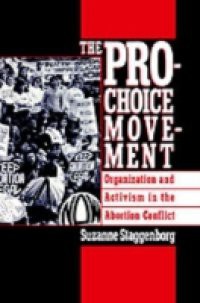In the 1960s a movement led by family planning activists and feminists emerged to challenge state anti-abortion laws, resulting in the landmark 1973 Supreme Court ruling Roe v. Wade, which legalized abortion throughout the U.S. Using interviews with past and present activists and historical records of movement organizations, this book traces the development of the "pro-choice" movement from its origins through the 1980s. The author shows how a small group of activists was able to build on the momentum created by other social movements of the 1960s to legalize abortion. Staggenborg argues that professional leadership and formalized organizational structures, together with threats from the anti-abortion movement, enabled the pro-choice movement to remain mobilized following legalization of abortion in 1973 and that these developments also facilitated grass-roots participation in the movement. This book will have particular significance for political sociologists, researchers, students, and others interested in women's studies and the abortion issue.

